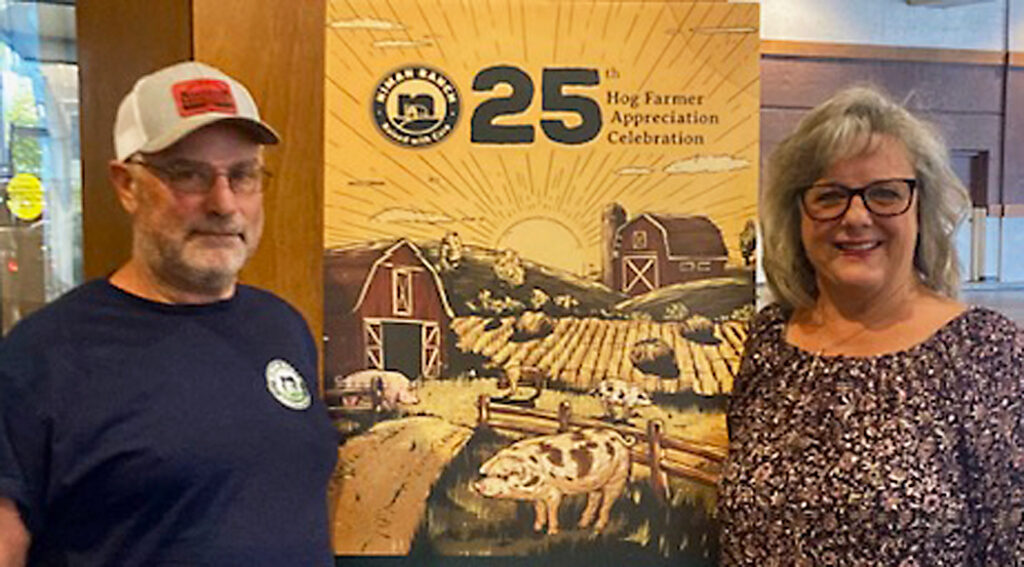
What does it take for a CAFO operator to transform a factory farm into a humane, independent farming operation? The Roseland family and Tanner Faaborg will share exactly how they did that at the upcoming JFAN Annual Meeting, “Leaving CAFOs Behind: Diverse Opportunities for Independent Family Farmers,” rescheduled for Wednesday, October 2, at 7:00 p.m. via Zoom.
Tim, Deleana and Curt Roseland transitioned their CAFO into a humane, sustainable hoop house operation to raise hogs for Niman Ranch. Tanner Faaborg, recently profiled in a New York Times article, converted his family’s 2200-head contract operation with Iowa Select into a specialty mushroom farm for medicinal tinctures and a coffee blend. Each will share how their similar beginnings of raising hogs took different turns when shuttering their CAFOs.
In 1977, sixteen-year-old Tim Roseland, a third-generation farmer, convinced his father to build a hog confinement, one of the first in Iowa, on the family farm. But raising hogs in a CAFO didn’t turn out the way he and his wife, Deleana, expected. In the 1990s, the Roselands decided to shut down their confinement to raise hogs in hoop houses for Niman Ranch.
Tim and Deleana will talk about what precipitated this decision and what it took to transform their confinement and farm. They’ll explain what it was like raising hogs in CAFOs, how their traditional farm now differs, how their attitude about factory farming changed, and all the ways raising for Niman benefited them and the community.
Several years ago, their son, Curt, joined the family business after a stint in the Army, and now two generations of Roselands are making a living raising hogs full time as independent Niman Ranch farmers. Curt will talk about what it’s like for him to join his family farm and why he encourages other young farmers to follow in his footsteps.
Following the Roselands, Alicia LaPorte, Niman Ranch Executive Director, will share the findings of a 2019 Iowa State University report that reveals how much Niman Ranch’s independent livestock producers contribute to Iowa’s economy.
Tanner Faaborg’s family took a completely different approach when leaving factory farming behind. In 1991, Tanner’s parents, Rand and Tammy Faaborg, contracted with Iowa Select and built two 1100-head confinements. At first the CAFOs provided a comfortable living, but by 2020, the Faaborgs were earning less from their hogs than they did 30 years ago. Rand felt trapped and wanted out.
Tanner, who’s worked on sustainability projects for several years, connected with the Transfarmation Project, a nonprofit organization that helps farmers transition away from CAFOs to raising crops for human consumption. The Faaborgs followed in the footsteps of some other former CAFO owners working with the Transfarmation Project to convert to a specialty mushroom farm.
Tanner will talk about what it was like for his family to operate their CAFO, including experiences contracting with Iowa Select. He’ll share how, with the blessings of his family, he is developing the mushroom farm and rewilding the property in the process.
Tanner will also discuss how he convinced his brother Tyler, a life-long Iowa Select employee managing CAFOs for the corporation in four counties, to leave that behind and join him on the mushroom farm. Tanner will include outlining his vision of using the farm as a model so other farmers can see there are viable, enjoyable alternatives to industrial livestock production and that it’s possible to transition away from CAFOs.
Rounding out the evening Kara Shannon, Director of Farm Animal Welfare Policy with the ASPCA, will give a brief overview of how the Ending Agricultural Trade Suppression (EATS) Act, a part of the 2024 Farm Bill under negotiation, would harm the Roselands and other independent livestock farmers who now have access to the California market through Proposition 12. The EATS Act would toss out requirements, passed by 63% of California voters, that prohibit the sale of pork, veal, chicken and eggs from livestock raised in gestation crates, veal crates, and battery cages. The EATS Act would also nullify states’ rights.
A question and answer session will follow the presentations.
The JFAN Annual Meeting is free and registration is required. Email JFAN at jfan@lisco.com to learn more.
